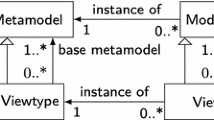Abstract
Projective modeling environments offer a more efficient and scalable way of supporting multiple views of large software systems than traditional, synthesis-based approaches to view-based development. However, the definition of the view projection transformations needed to create views, on demand, from the single underlying model and ensure that they remain synchronized is a complex and time-consuming process. In particular, to make views editable, the projection process involves the creation of “traces” to map view model elements to their sources in the single underlying model. While this is unavoidable for most view types, for a commonly occurring special case this level of complexity is not required. In this paper we therefore present a simpler approach, based on the OCL language, which simplifies the projection definitions for this kind of view. The approach is defined in the context of a deep, view-based modeling environment which combines support for views with multi-level modeling in order to seamlessly cover all phases of a system’s life cycle.
Access this chapter
Tax calculation will be finalised at checkout
Purchases are for personal use only
Similar content being viewed by others
References
5th International Workshop on Multi-Level Modelling - MULTI 2018. https://www.wi-inf.uni-duisburg-essen.de/MULTI2018/
ANTLR. https://www.antlr.org/
ISO/IEC/IEEE 42010:2011(E) (Revision of ISO/IEC 42010:2007 and IEEE Std 1471–2000). IEEE
Melanee 2.0—The deep-modeling domain-specific language workbench. http://www.melanee.org/
OMG Document - ormsc/01-07-01 (Model Driven Architecture (MDA)). https://www.omg.org/cgi-bin/doc?ormsc/2001-07-01, library Catalog: www.omg.org
Atkinson, C., Bayer, J., Bunse, C., et al.: Component-based software engineering. The KobrA Approach. In: CONQUEST 2001, 5th Conference on Quality Engineering in Software Technology. Proceedings, pp. 247–252 : Ill., Lit. (2001)
Atkinson, C., Gerbig, R.: Melanie: multi-level modeling and ontology engineering environment. In: Proceedings of the 2nd International Master Class on Model-Driven Engineering: Modeling Wizards, MW 2012, pp. 1–2. Association for Computing Machinery, Innsbruck, September 2012
Atkinson, C., Gerbig, R., Tunjic, C.: Towards multi-level aware model transformations. In: Hu, Z., de Lara, J. (eds.) ICMT 2012. LNCS, vol. 7307, pp. 208–223. Springer, Heidelberg (2012). https://doi.org/10.1007/978-3-642-30476-7_14
Atkinson, C., Gerbig, R., Tunjic, C.V.: Enhancing classic transformation languages to support multi-level modeling. Softw. Syst. Model. 14(2), 645–666 (2015)
Atkinson, C., Stoll, D., Bostan, P.: Orthographic software modeling: a practical approach to view-based development. In: Maciaszek, L.A., González-Pérez, C., Jablonski, S. (eds.) ENASE 2008. CCIS, vol. 69, pp. 206–219. Springer, Heidelberg (2010). https://doi.org/10.1007/978-3-642-14819-4_15
Atkinson, C., Tunjic, C.: A deep view-point language for projective modeling. In: 2017 IEEE 21st International Enterprise Distributed Object Computing Conference (EDOC), pp. 133–142, October 2017. ISSN 2325–6362
Burger, E.: Flexible views for view-based model-driven development. Ph.D. thesis, KIT Scientific Publishing, Karlsruhe (2014)
Davis, J., Daniels, R.: Effective DevOps: Building a Culture of Collaboration, Affinity, and Tooling at Scale, 1s edn. O’Reilly Media, Beijing/Boston, June 2016
Gerbig, R.: Deep, seamless, multi-format, multi-notation definition and use of domain-specific languages. Ph.D. thesis, University Mannheim, Mannheim (2017). https://ub-madoc.bib.uni-mannheim.de/42010/
Kennel, B.: A unified framework for multi-level modeling. Dissertation, University Mannheim, Mannheim (2012). https://ub-madoc.bib.uni-mannheim.de/31906
Kramer, M.E., Burger, E., Langhammer, M.: View-centric engineering with synchronized heterogeneous models. In: Proceedings of the 1st Workshop on View-Based, Aspect-Oriented and Orthographic Software Modelling, VAO 2013, pp. 1–6. Association for Computing Machinery, Montpellier, July 2013
Lange, A.: dACL: the deep constraint and action language for static and dynamic semantic definition in Melanee. Master’s thesis, University of Mannheim, Mannheim (2016). https://ub-madoc.bib.uni-mannheim.de/43490
Lange, A., Atkinson, C.: Multi-level modeling with MELANEE. In: CEUR Workshop Proceedings, pp. 653–662. RWTH, Aachen (2018)
Meier, J., et al.: Single underlying models for projectional, multi-view environments. In: Proceedings of the 7th International Conference on Model-Driven Engineering and Software Development. MODELSWARD 2019, pp. 117–128. SCITEPRESS - Science and Technology Publications, Lda, Portugal (2019). https://doi.org/10.5220/0007396401170128, event-place: Prague, Czech Republic
Meier, J., Winter, A.: Model consistency ensured by metamodel integration. In: MODELS Workshops (2018)
OMG: about the object constraint language specification version 2.4. https://www.omg.org/spec/OCL/2.4/PDF
Tunjic, C., Atkinson, C., Draheim, D.: Supporting the model-driven organization vision through deep, orthographic modeling. Enterp. Model. Inf. Syst. Architectures 13(7), 1–39 (2018). https://doi.org/10.18417/emisa.13.7, https://www.emisa-journal.org/emisa/article/view/138
Warmer, J.B.: The object constraint language: precise modeling with UML. Object Techology Series. Addison Wesley, Reading, Mass.; Bonn [u.a.] (1999)
Werner, C., Assmann, U.: Model synchronization with the role-oriented single underlying model. In: MODELS Workshops (2018)
Author information
Authors and Affiliations
Corresponding author
Editor information
Editors and Affiliations
Rights and permissions
Copyright information
© 2020 Springer Nature Switzerland AG
About this paper
Cite this paper
Lange, A., Atkinson, C., Tunjic, C. (2020). Simplified View Generation in a Deep View-Based Modeling Environment. In: Babur, Ö., Denil, J., Vogel-Heuser, B. (eds) Systems Modelling and Management. ICSMM 2020. Communications in Computer and Information Science, vol 1262. Springer, Cham. https://doi.org/10.1007/978-3-030-58167-1_12
Download citation
DOI: https://doi.org/10.1007/978-3-030-58167-1_12
Published:
Publisher Name: Springer, Cham
Print ISBN: 978-3-030-58166-4
Online ISBN: 978-3-030-58167-1
eBook Packages: Computer ScienceComputer Science (R0)




